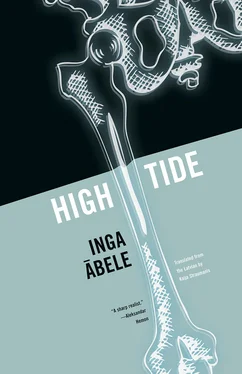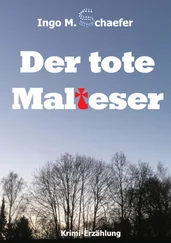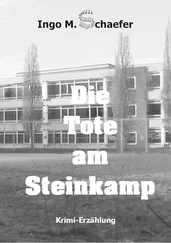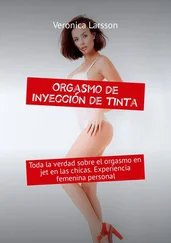The owner of the jean store apparently liked Ieva’s picture; he calls her the next day. Tells her to come for an interview at Hotel Riga.
The red-carpeted hallways of the grand downtown hotel knocks Ieva’s courage down a few notches. But she gets to the owner’s office and finds him to be good-looking and kind. And all smiles.
“Have you ever worked in sales? Do you have any experience working with a cash register?”
Ieva tells him she’s worked as a waitress, a secretary, and an advertising agent — but never as a sales associate.
“I think I’ll pick it up pretty quickly, and I’ll definitely have the time. No one ever goes into that store!”
The second she says it she bites her tongue. She’s said too much again, and it shows: the owner’s smile is gone, like someone hit a switch inside his head.
“Thanks, we’ll call you,” he cuts the interview short.
They don’t call, of course.
Her job search takes her farther and farther from the glossy center of downtown. One day Ieva ends up in a neighborhood of Jugendstil buildings. She finds a fabric store that needs a sales associate. Ieva gets the job and can hardly believe she’s finally working.
The director, Boris, only asks:
“Have you ever worked at the market?”
“No,” Ieva says.
“Good. The market teaches people to steal.”
That Ieva has zero sales experience doesn’t bother him. Boris even gives her a certificate that permits her to work with a cash register. And learning to use the register is so easy a dog could do it.
They’re a group of several cashiers, and they giggle all the time. There’s a phone on Ieva’s counter, and her duties include answering it the several times it rings throughout the day and explaining that the milking machine store has moved. The director’s apartment and office are above the store. He’s bought a part of this beautiful building; however, the façade is the only truly beautiful thing left about it. It used to house the apartments of Soviet Army officers, but those are now abandoned and have peeling wallpaper, battered stoves, and sawed-off radiators. The following winter is as cold as death itself; the cashiers walk around in fur coats and the loaders’ breaths come out in puffs. They’re brought a shipment of dry firewood once a week, and it’s the unspoken responsibility of the cashiers to bring it up to the fourth floor and into the empty apartment. The director and his wife host parties at their place on those days. Afterwards Ieva heads home in a cold tram, her insides burning with vodka and her skin all tingly. They don’t get Saturdays off, and there are more and more little things to take care of in the stock rooms on Sundays. Shifts from 8 a.m. to 7 p.m. are swallowing up Ieva’s time like a giant alligator. Sometimes she sees herself from the side — standing at her counter and using her spare moments to catch her breath and giggle with the other sales associates, who have become like sisters to her. And what do they laugh about? About nothing. It’s exhausted, meaningless laughter. They’re young, true, but work devours youth. Who does Ieva give up her days to? Her daughter barely knows her and sees her only late at night. Ieva’s mother complains about her health and that it’s hard for her to babysit Monta. The worst is that Ieva sees Aksels less, too.
Who does she give her time to? The store manager? What did he do to deserve such a valuable gift? The girls say nothing. Doesn’t matter which corner of Latvia they’re from — they watch what they say. It’s hard to find work. The director knows this and doesn’t pay them much.
Ninety lats a month for Ieva and almost the same for Aksels still isn’t enough to look for their own apartment. There’s no time to look, anyway.
One night as Ieva gets off the tram and heads home through the mess of drizzle and car headlights, she’s stopped by a pedestrian. Ieva looks at the face in front of her and her eyes suddenly connect with familiar features.
“Andrejs!” she cries out.
For a split second she feels nothing but pure joy. She even almost throws her arms around his neck to hug him. But Andrejs’s hunched shoulders and hands stuffed deep into his pockets quickly remind her of some things from the past; things that are near and dear, but at the same time as disgusting as an amputated limb now teeming with disease.
“What’re you doing here?” she asks, surprised.
“Waiting for you,” he answers and looks around for a place to get out of the rain. They go stand under the roof of the newspaper kiosk. Cars splash down the muddy road in front of them, tires blend snow with water, pedestrians jump over puddles.
“This is for Monta,” he hands her money. “Take it, just don’t spend it on that jackass.”
Ieva takes the money and counts it mechanically. Sixty lats. Andrejs is holding a business card in his calloused fingers. Ieva puts it in her purse. Her husband’s telephone number. Like a secret she has to hide from her lover, the thought comes to her.
“Have you been out to Zari?”
“I drive out now and then. Nothing’s changed.”
Ieva remembers the quiet forest surrounding the pasture. Even when they’re all dead and gone, the forest will be just as silent.
“So, how’s your little genius doing?” Andrejs sneers. “Do you read books at night, too?”
“More and more,” Ieva fights back tears. “Why did you even come if you’re just going to be mean?”
“How can I not be? What a love. Actually your mom called, said you’re not doing good at all. But that’s none of my business anymore. See ya,” he says, and heads off into the night.
Ieva trudges past storefronts. Her tears mix with the rain; no one will notice in this wintery mess. Everything’s messed up, nothing’s as she’d hoped it would be. So many useless quotes written in letters to her brother. Books are something different, something removed from real life.
Ieva doesn’t understand why she’s stopped in front of a bookstore. Very strange. It seems so long since she’s read something. Doesn’t even read newspapers anymore, only the bits of articles used as kindling for the stove in Boris’s office.
In spite of Andrejs she goes into the bookstore and slowly browses the shelves. Books have always been there, within arms’ reach, she realizes. They don’t impose themselves. Just wait.
She picks one up at random — Roberts Mūks. Eastern Religions — Meditation — Cyclical Time. Picks it up and opens it.
Cyclical time.
Ieva has no idea how long she’s been standing and reading. She doesn’t understand the text, only barely grasps what it’s about. The book is about something that has absolutely nothing to do with her life at that exact moment: the fabric store, money, her daughter getting sick, cold trams, cheap sausages, and bankrupt banks. But strangely enough, the text moves her, as if it was being read by someone whose existence Ieva wasn’t even aware of.
She quickly buys the book. It doesn’t matter that the money was meant for Monta. Ieva can skip her own dinner tonight. It’s only a few lats, yet at the same time — a fragile inspiration, swirling over the black streets like the Northern Lights.
Back at home, Ieva traps her mother in the bathroom. Blackish foam churns in the washing machine; her mother picks articles of clothing from the foam in a trance-like state and tosses them into the bath to be rinsed. The washing machine is probably as old as Ieva, and it’s finally broken down. When you turn it on it just churns and churns…
“Mom, why did you call Andrejs and talk to him about me?” Ieva confronts her mother in a threatening whisper.
Her mother looks at her. At this moment she is an old, ancient woman. Ieva’s heart even skips a beat. Her mother says:
Читать дальше












